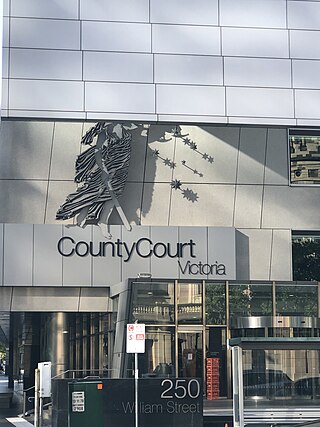Related Research Articles
A grand jury is a jury—a group of citizens—empowered by law to conduct legal proceedings, investigate potential criminal conduct, and determine whether criminal charges should be brought. A grand jury may subpoena physical evidence or a person to testify. A grand jury is separate from the courts, which do not preside over its functioning.

In many common law jurisdictions, an indictable offence is an offence which can only be tried on an indictment after a preliminary hearing to determine whether there is a prima facie case to answer or by a grand jury. A similar concept in the United States is known as a felony, which for federal crimes, also requires an indictment. In Scotland, which is a hybrid common law jurisdiction, the procurator fiscal will commence solemn proceedings for serious crimes to be prosecuted on indictment before a jury.

A summary offence or petty offence is a violation in some common law jurisdictions that can be proceeded against summarily, without the right to a jury trial and/or indictment.
The courts of England and Wales, supported administratively by His Majesty's Courts and Tribunals Service, are the civil and criminal courts responsible for the administration of justice in England and Wales.

Under the law of the United Kingdom, high treason is the crime of disloyalty to the Crown. Offences constituting high treason include plotting the murder of the sovereign; committing adultery with the sovereign's consort, with the sovereign's eldest unmarried daughter, or with the wife of the heir to the throne; levying war against the sovereign and adhering to the sovereign's enemies, giving them aid or comfort; and attempting to undermine the lawfully established line of succession. Several other crimes have historically been categorised as high treason, including counterfeiting money and being a Catholic priest.

The courts of quarter sessions or quarter sessions were local courts traditionally held at four set times each year in the Kingdom of England from 1388. They were also established in Scotland, Ireland and in various other dominions of the British Empire.

A sheriff court is the principal local civil and criminal court in Scotland, with exclusive jurisdiction over all civil cases with a monetary value up to £100,000, and with the jurisdiction to hear any criminal case except treason, murder, and rape, which are in the exclusive jurisdiction of the High Court of Justiciary. Though the sheriff courts have concurrent jurisdiction with the High Court over armed robbery, drug trafficking, and sexual offences involving children, the vast majority of these cases are heard by the High Court. Each court serves a sheriff court district within one of the six sheriffdoms of Scotland. Each sheriff court is presided over by a sheriff, who is a legally qualified judge, and part of the judiciary of Scotland.
A hybrid offence, dual offence, Crown option offence, dual procedure offence, offence triable either way, or wobbler is one of the special class offences in the common law jurisdictions where the case may be prosecuted either summarily or as indictment. In the United States, an alternative misdemeanor/felony offense lists both county jail and state prison as possible punishment, for example, theft. Similarly, a wobblette is a crime that can be charged either as a misdemeanor or an infraction, for example, in California, violating COVID-19 safety precautions.
In English law, oyer and terminer was one of the commissions by which a judge of assize sat. Apart from its Law French name, the commission was also known by the Law Latin name audiendo et terminando, and the Old English-derived term soc and sac.
The High Court of Ireland is a court which deals at first instance with the most serious and important civil and criminal cases. When sitting as a criminal court it is called the Central Criminal Court and sits with judge and jury. It also acts as a court of appeal for civil cases in the Circuit Court. It also has the power to determine whether or not a law is constitutional, and of judicial review over acts of the government and other public bodies.
Diplock courts were criminal courts in Northern Ireland for non-jury trial of specified serious crimes. They were introduced by the Northern Ireland Act 1973 and used for political and terrorism-related cases during the Troubles. The Justice and Security Act 2007 ended the automatic use of non-jury trials for scheduled offences but they are still used in Northern Ireland upon certification by the Director of Public Prosecutions on a case-by-case basis.
Summary jurisdiction, in the widest sense of the phrase, in English law includes the power asserted by courts of record to deal brevi manu with contempts of court without the intervention of a jury. Probably the power was originally exercisable only when the fact was notorious, i.e. done in presence of the court. But it has long been exercised as to extra curial contempts.

In law, a committal procedure is the process by which a defendant is charged with a serious offence under the criminal justice systems of all common law jurisdictions except the United States. The committal procedure replaces the earlier grand jury process.
The courts of Northern Ireland are the civil and criminal courts responsible for the administration of justice in Northern Ireland: they are constituted and governed by the law of Northern Ireland.

The Courts of Justice Act 1924 was an Act of the Oireachtas that established a new system of courts for the Irish Free State. Among the new courts was the Supreme Court of the Irish Free State, and the first Chief Justice of the Irish Free State was also appointed under the Act.
The District Court is the main court of summary jurisdiction in Ireland. It has responsibility for hearing minor criminal matters, small civil claims, liquor licensing, and certain family law applications. It is also responsible for indicting the accused and sending them forward for trial at the Circuit Court and Central Criminal Court.
The Circuit Court of Ireland is an intermediate level court of local and limited jurisdiction which hears both civil and criminal matters. On the criminal side the Circuit Court hears criminal matters tried on indictment with a judge and jury, except for certain serious crimes which are tried in either the Central Criminal Court or the Special Criminal Court. On the civil side the Circuit Court has a considerable parallel jurisdiction — including equitable remedies — with the High Court but normally cannot award damages of more than €75,000. The Circuit Court also hears de novo appeals from the District Court in both civil and criminal matters.
An information is a formal criminal charge which begins a criminal proceeding in the courts. The information is one of the oldest common law pleadings, and is nearly as old as the better-known indictment, with which it has always coexisted.

The courts of assize, or assizes, were periodic courts held around England and Wales until 1972, when together with the quarter sessions they were abolished by the Courts Act 1971 and replaced by a single permanent Crown Court. The assizes exercised both civil and criminal jurisdiction, though most of their work was on the criminal side. The assizes heard the most serious cases, most notably those subject to capital punishment or later life imprisonment. Other serious cases were dealt with by the quarter sessions, while the more minor offences were dealt with summarily by justices of the peace in petty sessions.
The Judiciary of Sri Lanka are the civil and criminal courts responsible for the administration of justice in Sri Lanka. The Constitution of Sri Lanka defines courts as independent institutions within the traditional framework of checks and balances. They apply Sri Lankan Law which is an amalgam of English common law, Roman-Dutch civil law and Customary Law; and are established under the Judicature Act No 02 of 1978 of the Parliament of Sri Lanka.
References
- ↑ "History of the Law". Archived from the original on 17 October 2010. Retrieved 17 October 2010.
- ↑ 3 Geo. 2, chap. 15
- ↑ Molloy, Constantine (1867). "A Central Criminal Court for the County and City of Dublin" (PDF). Journal of the Statistical and Social Inquiry Society of Ireland. 34.; MCI (1835) Rpt Appendix: Dublin, p.45
- ↑ McDonnell, A. D. (2000). The Life of Sir Denis Henry: Catholic Unionist. Ulster Historical Foundation. p. 105. ISBN 9780901905949 . Retrieved 22 February 2019.
- ↑ "Judicature (Northern Ireland) Act 1978". legislation.gov.uk. Retrieved 28 June 2021.